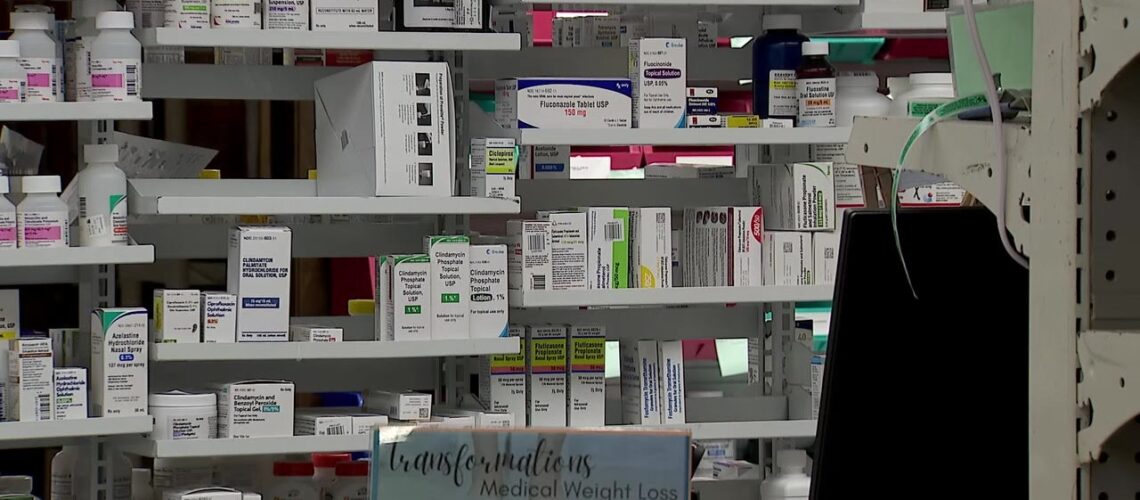Healthcare insurance companies blamed for ‘pharmacy deserts’ in Minnesota
December 19, 2024

- 2025 Affordable Care Act Health Insurance Marketplace
- Florida seeks help from Trump before instating new kids health insurance requirements
- Luigi Mangione Plotted for Weeks to ‘Wack’ an Insurance CEO: Feds
- How CEOs can pick up the ball on insurance coverage
- Advocacy Groups Ask FIO to Release Homeowners Insurance Data Collected by NAIC
Inflated drug costs creating ‘Pharmacy deserts’
Pharmacy benefit managers are being blamed for “pharmacy deserts” being left across Minnesota as inflating drug costs squeeze out small-town pharmacies. FOX 9’s Kelcey Carlson has the full story.
Bạn đang xem: Healthcare insurance companies blamed for ‘pharmacy deserts’ in Minnesota
(FOX 9) – Minnesota has lost hundreds of pharmacies in a little over a decade, creating “pharmacy deserts” that are forcing people to travel a lot farther or rely on mail service to obtain their prescription medications.
Prescription Benefit Managers under growing scrutiny
Why You Should Care: Minnesota has lost hundreds of pharmacies in a little over a decade, creating “pharmacy deserts” that are forcing people to travel a lot further or rely on mail service to obtain their prescription medications.
Local Perspective: Pharmacists like Debroah Keaveny, who owns and operates Keaveny Drug in Winsted, says independent pharmacies are being driven out of business by Prescription Benefit Managers (PBMs). PBMs are supposed to operate as a middleman that negotiate prices with insurance providers and drug manufacturers. But now PBMs are under the same ownership umbrella as large insurance companies and pharmacy chains. Express Scripts, CVS Caremark and Minnesota-based Optum control pricing for about 80 percent of prescriptions filled in the U.S, according to federal regulators. Optum is in an ownership chain with United Healthcare, CVS Caremark with Aetna and Express Scripts with Cigna.
“The big three control who I can fill prescriptions for, what prescription I can fill, how often I can fill them and what I’m going to get paid for it,” Keaveny said.
Keaveny has joined a class action lawsuit against PBMs and is advocating for new legislation at the state and federal level. She is also partnering with Mark Cuban on a project designed to lower the cost of prescription drugs.
Dig Deeper: State and federal regulators are also pointing the finger at PBMs.
In July, the Federal Trade Commission found “these powerful middlemen may be inflating drug costs” and “squeezing main street pharmacies.”
The report finds states: “PBMs wield enormous power over patients’ ability to access and afford their prescription drugs, allowing PBMs to significantly influence what drugs are available and at what price. This can have dire consequences, with nearly 30 percent of Americans surveyed reporting rationing or even skipping doses of their prescribed medicines due to high costs, the report states.
Xem thêm : MHA names Ahmer Khan as head of insurance
The interim report also finds that PBMs hold substantial influence over independent pharmacies by imposing unfair, arbitrary, and harmful contractual terms that can impact independent pharmacies’ ability to stay in business and serve their communities.”
The federal investigation also found PBMs exert substantial influence over independent pharmacies that find the contractual terms “confusing, unfair arbitrary and harmful.”
The FTC report, legal action and statements:
Pharmacy Deserts in Minnesota
In some cases, the largest benefit managers were accused of giving “higher reimbursement rates” to their own pharmacies.
“In the beginning (PBMs) were kind of a middleman between pharmacies and the insurance companies,” said Deborah Leedahl, who recently closed her pharmacy in Elk River. “But things started to change when insurance companies started to buy out the PBMs.”
By the Numbers: Minnesota had 406 independent pharmacies in 2012. That number has been whittled down to just 156 today.
What we know: In Minnesota, it is illegal for a PBM to require a patient to use a pharmacy that it owns. CVS Caremark was fined $1.5 million in 2022 for requiring members to use their own pharmacies to get maintenance drugs for conditions like diabetes and high blood pressure.
The Minnesota Department of Commerce said it contributed to the growing number of “pharmacy deserts” across the state.
“In some cases, those members had to drive 20 to 130 miles to get to a CVS store rather than refill a medication at a non-CVS pharmacy,” said Jaqueline Olson, the Assistant Commissioner of Enforcement at the Department of Commerce.
Xem thêm : Gettysburg Man Charged with Insurance Fraud After Filing Claim Before Policy Effective Date
CVS Caremark settled the case for $500,000.
The other side: The companies that operate PBMs defended their role in drug pricing. CVS Caremark, Express Scripts or Optum would not agree to an interview for this story.
In statements, they all argued that PBMs lower prices for customers while reimbursing pharmacies at higher rates.
CVS Caremark statement: “The FTC was created to protect consumers. Any suggestions from the FTC about policies that limit the use of PBM negotiating tools would instead reward the pharmaceutical industry, leaving American businesses and patients at the mercy of the prices drugmakers set. We will defend the use of these tools vigorously as we continue working to safeguard our clients and their members from drug price gouging by pharmaceutical manufacturers.”
Express Scripts statement: “The FTC has taken unconstitutional actions in publishing a report that ignores the evidence provided by our company and other PBMs, demonstrates clear ideological bias and advances a false and damaging narrative – a narrative that could harm the health care system by removing essential checks and balances which would result in higher drug prices for American consumers,” said Andrea Nelson, Chief Legal Officer for The Cigna Group. “We don’t take this step lightly, but as advocates working to lower drug prices for millions of Americans and the employers, labor unions, and government agencies that provide their prescription drug benefits, we cannot let the FTC’s unlawful actions and false information stand.”
Optum statement: “PBMs, like Optum Rx, are the key counterweight to pharmaceutical companies’ otherwise unchecked monopoly power to set and raise drug prices, and the money we are saving the employers, unions, governments and payers who rely on us to negotiate savings is helping consumers through reduced premiums, point-of-sale discounts on medicines and greater investment in population health and wellness programs.”
Optum is a subsidiary of UnitedHealth. The Minnesota based company’s profits and policies came under scrutiny after the killing of Brian Thompson. Thompson was the CEO of United Healthcare. His tragic death led to murder charges and questions about the shooters’ motivation. But it also sparked outrage online over the company’s denial rates.
What’s next: Federal regulators say PBMs’ lack transparency. A bipartisan bill to add more transparency was passed in the US House one year ago, in December 2023. And Senator Klobuchar did vote to advance this bill out of committee in the Senate, but it has not reached the Senate floor.
We asked Deb Keaveny what happens to her customers if she closes her doors.
“They have to find another place to go. 20-plus miles or go to mail order and mail order isn’t always convenient,” she says. “If you have an infection or pain, you can’t wait three weeks to get a prescription filled and who is going to explain it to you, the mailman?” she added.
Nguồn: https://propertytax.pics
Danh mục: News
